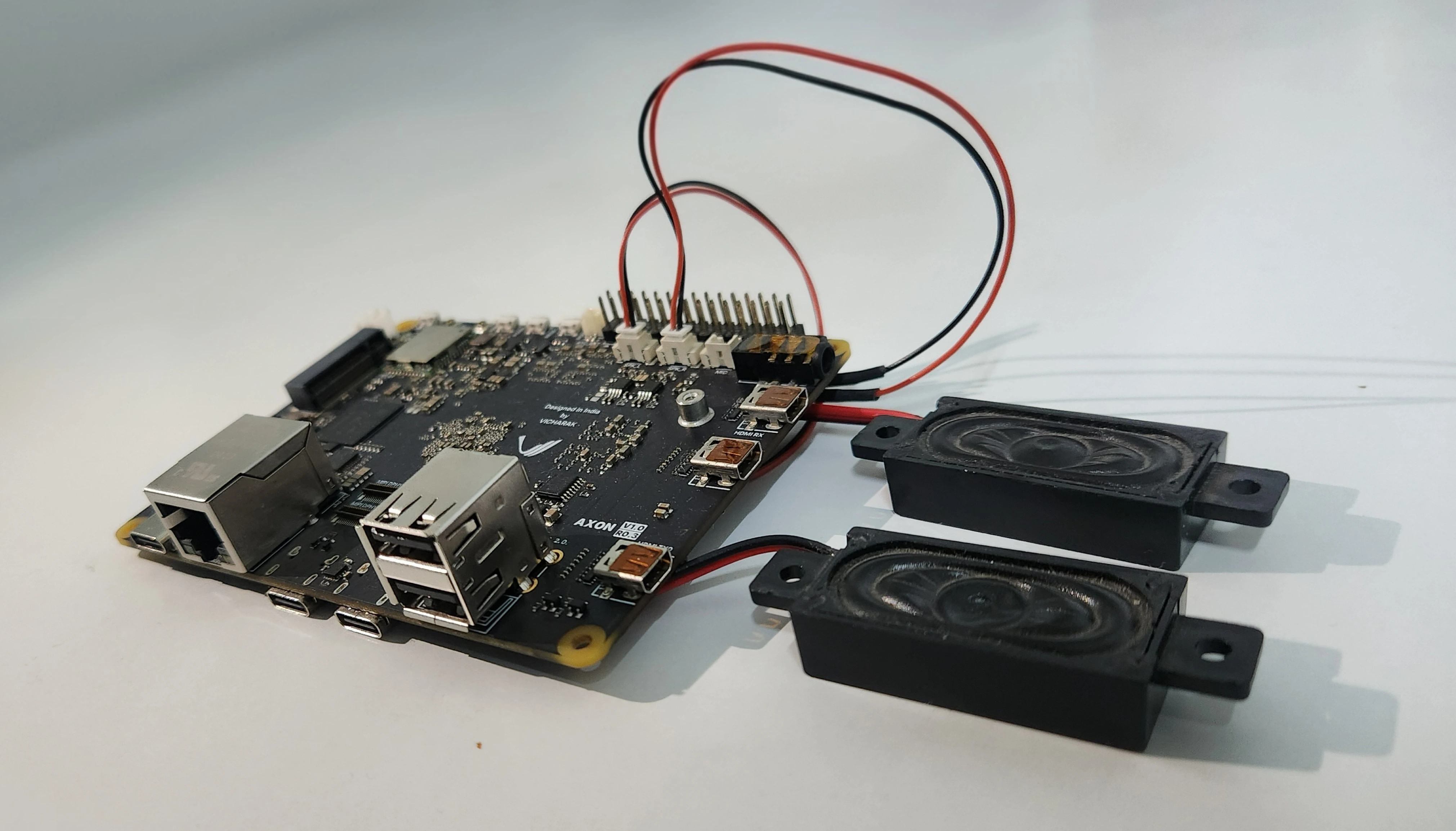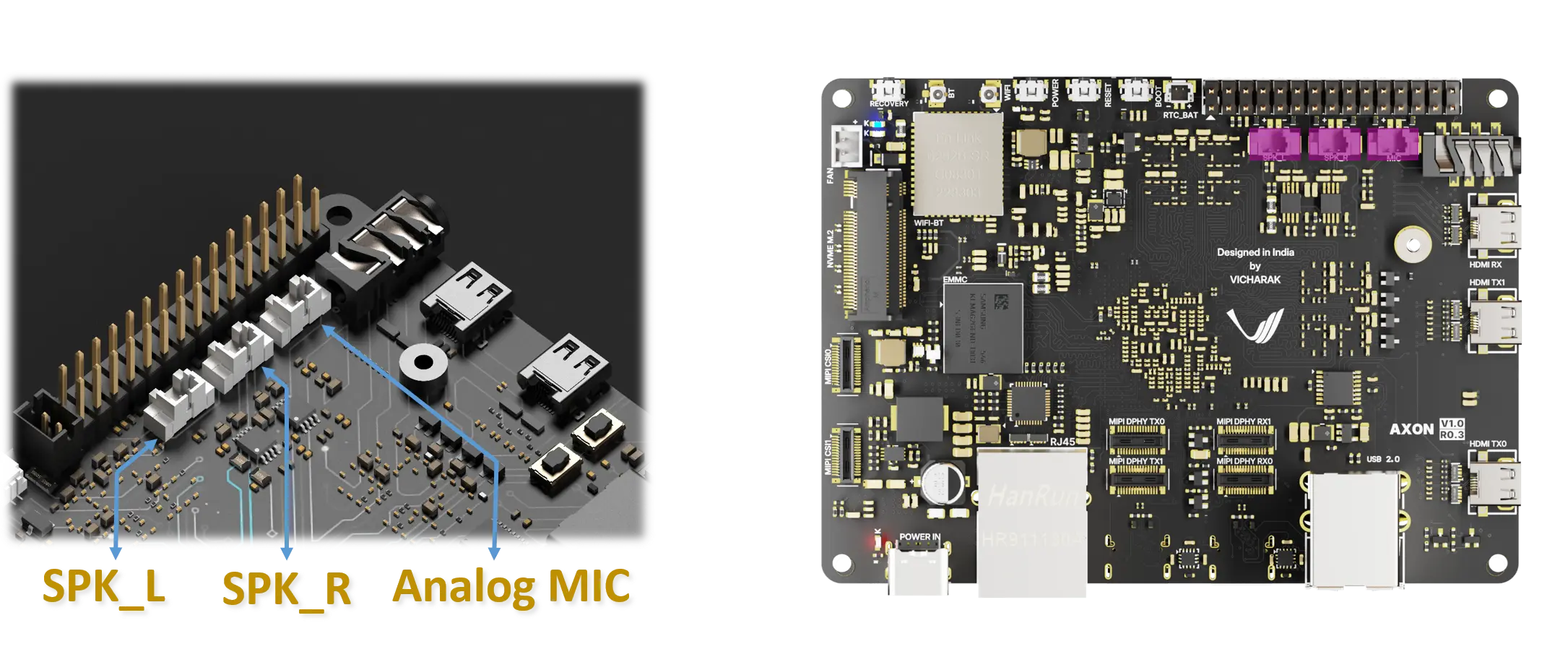Audio
Overview
The rockchip-es8388 audio codec, detected as card 0 in Linux, is an I2S-based audio solution used on the Axon platform. It enables both audio input and output functionality through the ES8388 chip, which integrates a DAC (Digital-to-Analog Converter) and an ADC (Analog-to-Digital Converter). This codec interfaces with the system via the I2S bus and is commonly used in designs requiring high-quality analog audio capture and playback.

Hardware Interface

Speaker Output
Connector Type: W2B Connector
Pin Count: 2-pin
Pin Pitch: 1.25mm
Current Rating: Max 1A per pin
MPN: WAFER-125L-2A
Speaker Specifications: - Load Impedance: 4 ohm - Rated Power: 3W
Microphone Input
Type: Analog Differential Microphone
Warning
If you want to use an analog single-ended microphone, connect:
The positive wire of the microphone to the positive pin of the mic connector.
The negative wire of the microphone to ground on Axon GPIO Pin Header.
This configuration allows compatibility with both differential and single-ended analog microphones.
Tip
To get more information on Axon GPIO Header.
Device Information
aplay -l lists all sound cards and their playback devices that are recognized by ALSA (Advanced Linux Sound Architecture) on your system.
vicharak@vicharak:~$ aplay -l
**** List of PLAYBACK Hardware Devices ****
card 0: rockchipes8388 [rockchip-es8388], device 0: dailink-multicodecs ES8323 HiFi-0 [dailink-multicodecs ES8323 HiFi-0]
Subdevices: 1/1
Subdevice #0: subdevice #0
This indicates that:
The ALSA card index is 0.
The playback device index is 0.
The hardware device name can be referred as hw:0,0.
Playback Using aplay
You can use the ALSA aplay tool to play WAV audio files using the rockchip-es8388 codec:
aplay -D hw:0,0 test.wav
Where:
-D hw:0,0selects the rockchip-es8388 card and its device.test.wavshould be a valid.wavfile (preferably 16-bit, 44.1kHz or 48kHz).
Check supported formats:
aplay -D hw:0,0 --dump-hw-params /dev/zero
This will print the supported formats, rates, and channel configurations for the device.
vicharak@vicharak:~$ aplay -D hw:0,0 --dump-hw-params /dev/zero
Playing raw data '/dev/zero' : Unsigned 8 bit, Rate 8000 Hz, Mono
HW Params of device "hw:0,0":
--------------------
ACCESS: MMAP_INTERLEAVED RW_INTERLEAVED
FORMAT: S16_LE S24_LE
SUBFORMAT: STD
SAMPLE_BITS: [16 32]
FRAME_BITS: [32 64]
CHANNELS: 2
RATE: [8000 96000]
PERIOD_TIME: (333 8192000]
PERIOD_SIZE: [32 65536]
PERIOD_BYTES: [256 524288]
PERIODS: [2 4096]
BUFFER_TIME: (666 16384000]
BUFFER_SIZE: [64 131072]
BUFFER_BYTES: [256 524288]
TICK_TIME: ALL
--------------------
aplay: set_params:1371: Sample format non available
Available formats:
- S16_LE
- S24_LE
Setting Volume with amixer
You can adjust the playback volume using amixer:
amixer -c 0
This shows all controls for the ES8388 device.
Troubleshooting
No sound: - Ensure the output device (e.g., speaker or headphone) is connected properly.
Use
alsamixer -c 0and check if the output channels are unmuted and have volume.Make sure your
.wavfile format matches the supported codec parameters.
Permission Denied:
Run commands with
sudo, or ensure the user is in theaudiogroup.
Device Busy:
Some other process (like PulseAudio or PipeWire) may be using the device. Try stopping them or use aplay with -D plughw:0,0.
Useful Commands
aplay -l # List all playback devices
aplay -D hw:0,0 file.wav # Play audio using ES8388
alsamixer -c 0 # Graphical volume control for ES8388
amixer -c 0 # Command-line mixer settings
speaker-test -D hw:0,0 -c 2 -t wav # Test stereo output